Barrett Firearms Manufacturing of Murfreesboro, TN is known around the world for building heavyweight, hard-hitting 50 BMG rifles for the military and law enforcement. Barrett’s a family owned business and has been supplying firearms for the US and its allies for over 30 years. With the Fieldcraft they jumped completely to the other end of the firearms spectrum- from one of the biggest and heaviest shoulder fired rifles to one of the lightest, most versatile hunting rifles on the market.
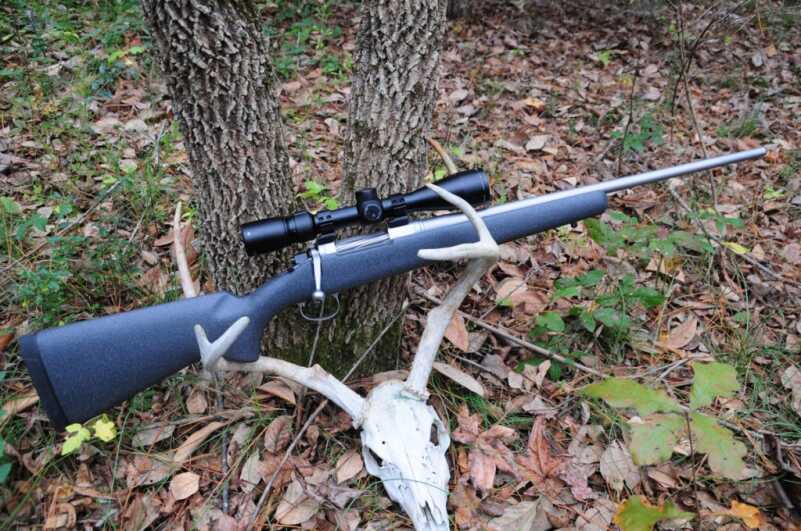
The Fieldcraft’s matte finishes blended well with the gray’s of the morning sky. Remains were all I was able to find while taking the Fieldcraft to the woods, but at least I knew I was in the right area.
Barrett obviously focused their considerable resources on designing and developing the new Fieldcraft before it came to market, as the compact gun leaves little else to be desired.
What is it you really want in a good hunting rifle? Lightweight, ease of handling, weather resistance, good trigger and an accurate barrel is all you really need. They delivered all of these and more.
Barrett clearly started with a clean slate, only added in what was mission essential, and trimmed everything else away to reduce weight. Every part of the gun seems to have been addressed to reach the objective of building a premier hunting rifle.
Having hunted the Rockies a few times myself, I know how much a pound here or there matters when you are hiking up and down mountains day after day chasing elk or mule deer. As one of my military friends so eloquently pointed out, “ounces make pounds.” It doesn’t matter if you’re humping the mountains of Afghanistan or Colorado, if you’re from the flatlands and you get above 8000 feet the air starts to taste real thin on oxygen and the lighter your load the better you’ll like it.
Specifications
Caliber – 308 Win (tested, 9 others available)
Action – Stainless Steel Bolt action
Barrel length – 21” (as tested, others available)
Overall length – 41”
Stock – Carbon Fiber
LOP – 13 ¾”
Weight – 5-6 lbs. (depending on caliber)
Safety – Two position
MSRP – $1,799
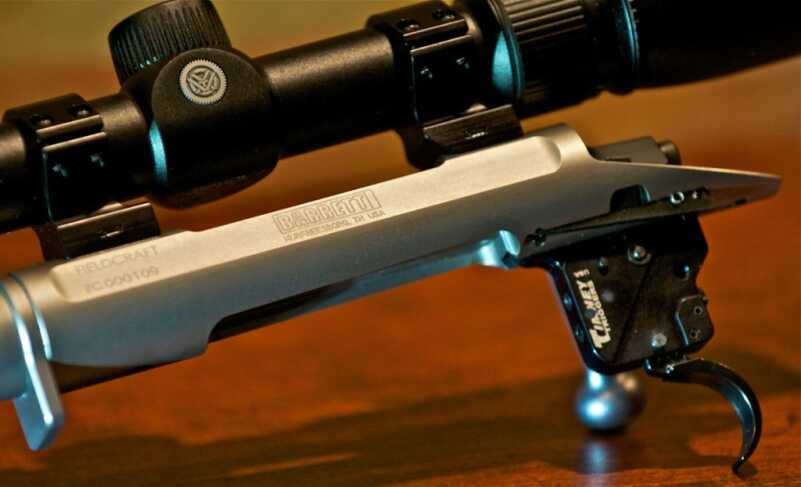
The action sizes are scaled depending on the caliber of the gun. The action including bolt on the 308-model tested is a full 5/8 of an inch shorter than a Remington 700 short action and is smaller in diameter.
The Fieldcraft action and barrel are made of 416 stainless steel; a proven performer in barrel materials. Worrying about your gun’s finish isn’t what needs to be on your mind when you’re chasing your dream bull up and down the mountains.
In addition, instead of being a full round contour receiver, Barrett achieved part of the weight savings by scalloping the right and left sides of the upper part of the receiver. The smaller, lighter receiver didn’t seem to adversely affect accuracy when we got to the range.
The bolt is also considerably downsized and fluted to reduce weight. The bolt handle is smaller in nature than most guns but was fast and easy to operate. Have no doubt this gun was put on a serious diet by the folks at Barrett, and you’ll appreciate it when you carry it to the field.
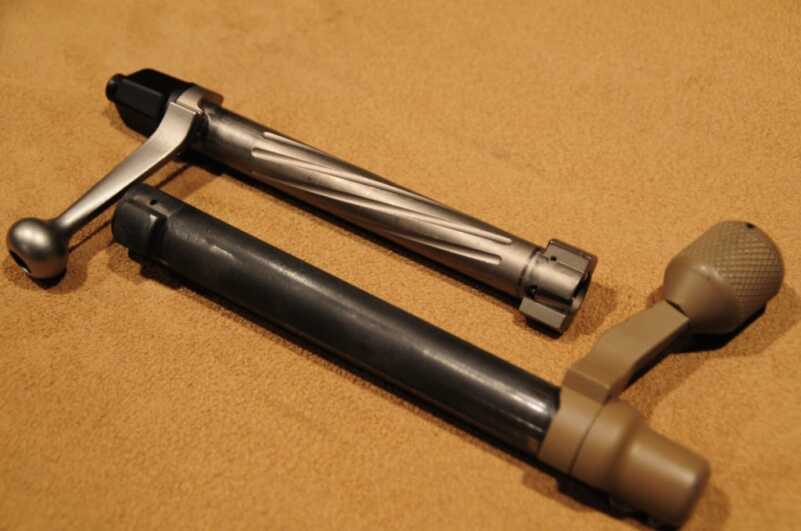
Fieldcraft bolt (top) compared to a Rem 700 short action bolt (below); shorter, thinner, fluted = lighter, much lighter!
The 308 tested sports a 21” lightweight 1-10 barrel, but I would not say it is underweight. Like everything else on the Fieldcraft, it’s appropriately scaled for the gun and the task at hand. They advertise that each gun is tested and delivers sub-moa accuracy with heavy high-grade hunting ammunition.
Shorter threaded barrel versions are also available to support the growing trend of hunting with suppressors that are sweeping many states in the country.
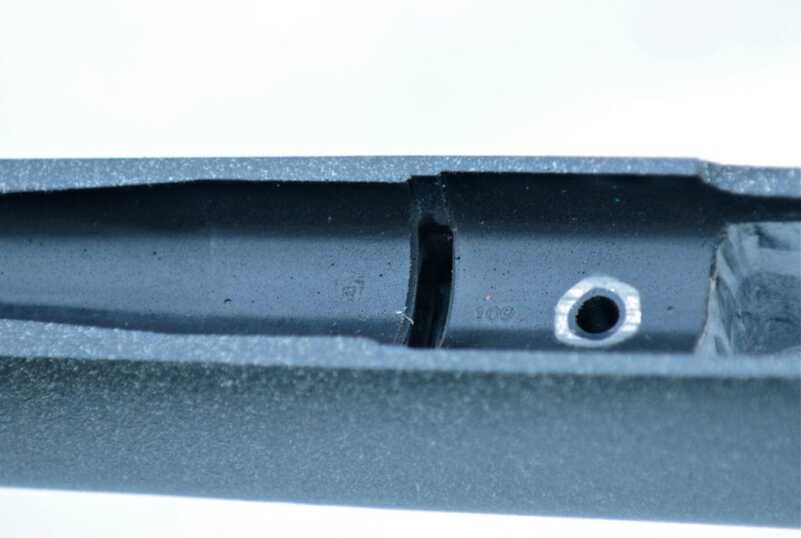
Aluminum pillar bedding is used to hold the receiver in place. Recoil lug pocket can be seen in the bedding material.
The stock is hand-laid carbon fiber, and very rigid for its small size. The stock has a slight texture that allows a good grip without being overly aggressive; it’s just right, not too slick or rough.
 The stock has a 13 ¾” length of pull and was very comfortable to shoot and achieve proper eye relief on the scope.
The stock has a 13 ¾” length of pull and was very comfortable to shoot and achieve proper eye relief on the scope.
The biggest surprise I found when examining the gun is that the barrel and action are full-length bedded. In an age when almost everyone else is free floating the barrel, Barrett chose to bed the barrel from the tip of the fore end all the way back around the action.
Barrett states that it was done this way to increase stock rigidity and decrease barrel harmonics. Well, the stock certainly is rigid and having over 10 inches of the barrel bedded should certainly cut down on the barrel harmonics.
You have to assume they tried the free-float approach and found this to be better for this application. As solid as the gun feels and as well as it performs, it’s not worth questioning further.
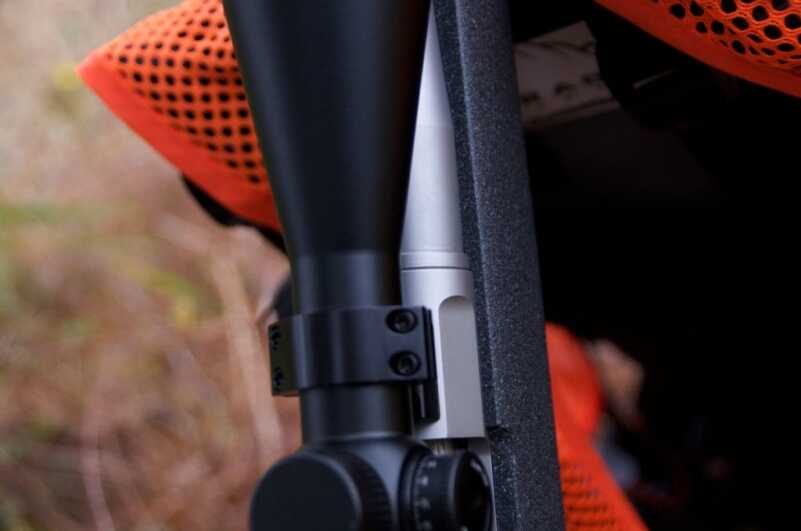
The bedding job is executed flawlessly; it has crisp clean lines surrounding the barrel, recoil lug, and action.
Going back to the receiver for a minute, Barrett threaded the receiver for #8 screws for added strength rather than the smaller #6’s found on some other guns. In addition, they added a third hole for scope base mounting on the forward part of the receiver. This additional hole allows you some flexibility when installing the mounts to best support your scope.
As I said earlier, they left little else to be desired; they covered all the bases; almost as if they had built guns that would be taken into battle where lives depended on it.
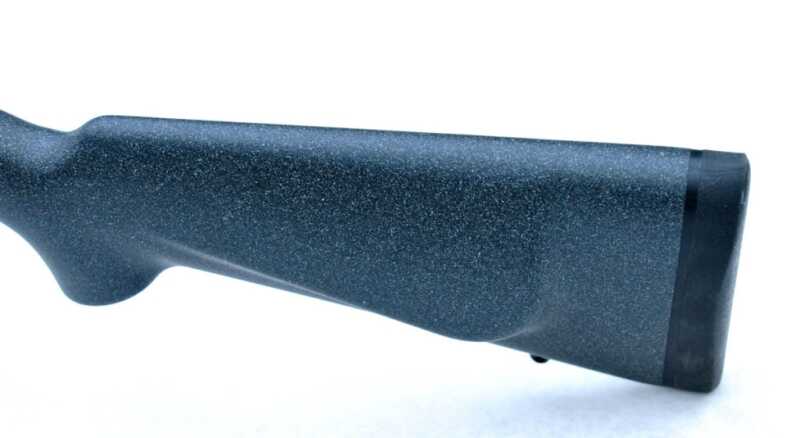
The well-shaped grip and cheek piece added to the familiar handling and comfort while shooting the Fieldcraft.
Hanging from my trigger scale, with the recoil pad and the trigger guard still installed, the stock assembly weighed in at a mere 29oz. I wanted to pull off the recoil pad and trigger guard to get the bare weight but resisted the temptation. Of course, the stock is fitted with front and rear sling swivel studs for ease of carrying.
The short action has a 3” 4 round internal box magazine in the stock. This also helped to reduce overall weight compared to a detachable magazine and allowed a small lightweight trigger guard. To help soften the blow from shooting the lightweight slugger the stock is fitted with a Decelerator recoil pad.
The weight of the gun with Talley rings holding a one-inch Vortex Razor HD 2-10x was a feathery 6 lbs. 6 oz. Shooting the gun was not as harsh as I expected and I had no problem doing group testing with multiple loads in a one afternoon.
On many parts of the gun Barrett did a great job of reinventing the wheel, innovating where needed to bring a great little gun into existence; on the trigger they didn’t need to get creative, they just installed a Timney.
The installed trigger broke cleanly at 2lbs 12oz and was a joy to shoot. The gun has a two-position safety located on the right-hand side of the receiver and an out of the way little bolt release on the left side.
Test Firing
Typically, lighter weight guns are more difficult to shoot well, as they just don’t want to sit and track the way a heavier gun would. However since you’re probably going to carry a hunting gun more than you’re going to shoot it, it’s worth a bit more focus.
Most manufacturers shoot 3 shot groups when testing accuracy to meet their sub-moa standard. As the Fieldcraft is fitted with a 4 round magazine I went ahead and shot 4 round groups at 100 yds for the accuracy testing.
I have little doubt that the 3 shot group sizes would have ended up with better numbers than the 4 round groups below as the lightweight barrel would have heated up less and had one less opportunity to open the group size up.
Barrett makes a point of stating that they use HEAVY BT ammunition for the testing. Most of what I tested would be considered medium weight bullets but was ammunition some would probably use for hunting.
All but the Fusions shot what I would consider being accuracy suitable for hunting out to 400 yards or so, a true accomplishment for a gun/ scope combo weighing in at 6 ½ pounds.
I shot the Black Hills 168 Match ammo as a test standard. Quality 168 HPBT ammunition has always been one of the gold standards of accuracy for the 308 Win. It didn’t disappoint in this case either.
| Ammunition | 4 Round Group Size |
| Nosler Trophy Grade 165 Grn BT | 1.48” |
| Federal Fusion 150 Grn Soft point | 2.8” |
| Black Hills 308 Match 168Grn HPBT | 1.15” |
| Hornady Super Performance 165 Grn GMX | 1.56” |
I was very pleased with the accuracy of the lightweight 308, but to be fair to Barrett I did want to try it with some Heavy boat tail bullets to see its true potential. I’m kinda an accuracy snob, and also a big fan of heavy, high ballistic coefficient bullets. They buck the wind better, hit harder and penetrate deeper.
Fieldcraft definitely preferred heavier bullets, and so do I. The recoil was a bit more noticeable with the added payload from heavier rounds.
I rounded up a box of Hornady 178’s and made another trip to the range racing against the setting sun. The 100 yard, 3 shot group easily verified Barrett’s sub-moa claims.
Pushing the limits in the fading light I reset the target to 300 yards and launched another 3 round group. I feel certain a lack of precision on my part was more at fault than the gun or ammunition in not making the sub-moa standard out at 300 yards. This gun is definitely a fine shooter.
| Ammunition | 3 Round Group Size (100 yds) | 3 Round Group Size (300 yds) |
| Hornady 178 HPBT | .72” | 3.2 |
Field Testing
I carried the Fieldcraft to the woods a couple times looking for a local Whitetail to allow me to put some meat in the freezer. The gun was a pleasure to carry; the lightweight and handy overall length made it easy to slip through the woods while stalking to my hunting area.
Heavy hunting pressure in the area or perhaps me snapping a few photos made the hunt unsuccessful but did allow me to spend several hours handling and moving through the surrounding woods and fields with the Fieldcraft.
Knowing it was capable of reaching out to about 400 yards I practiced resting it on the top of my pack and steadying on a variety of targets from 100 to 400 yards, I feel confident that if I been lucky enough to find a target I would have been successful in bringing it home.
The Good
The Fieldcraft is a well-designed, superbly manufactured lightweight hunting rifle. It delivers what it promises. It’s light, it’s accurate and it should last a lifetime. It’s made in the USA, by folks that have been in the business of making serious firearms for over 30 years.
The Bad
It is not a low-cost rifle, though the attributes of the Fieldcraft are closer to a custom gun than of an off the shelf box store blaster. None of the carbon fiber stocked, precision rifles on the market are low cost, so for all you get I feel the Fieldcraft is still a value purchase, and you get what you pay for.
The Ugly
You left handed guys are still out of luck, only right-handed models available for now.
Bottom Line
If you need a lightweight gun to carry up and down the mountains and still be able to reach across the next gorge to put down the trophy you’ve been chasing, this is just the gun you looking for.
Learn more about Barrett by clicking, HERE.
***Check out GunsAmerica for your next Barrett Fieldcraft rifle***

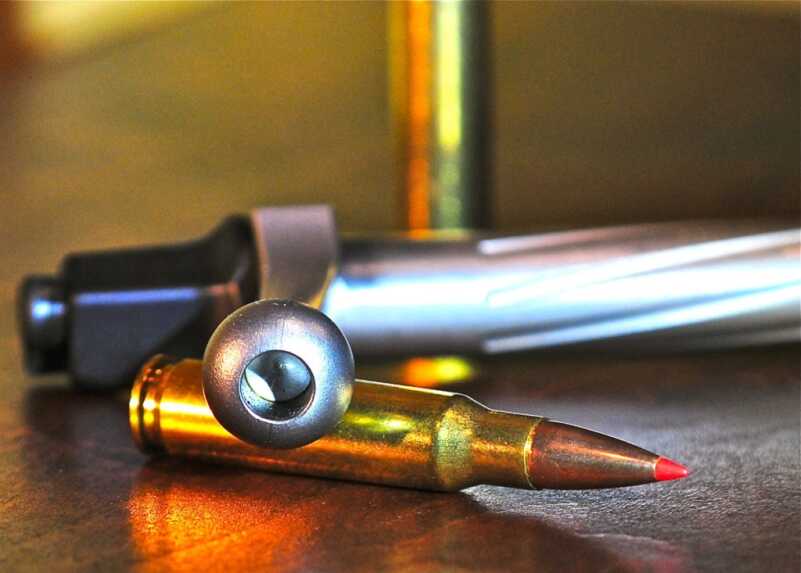
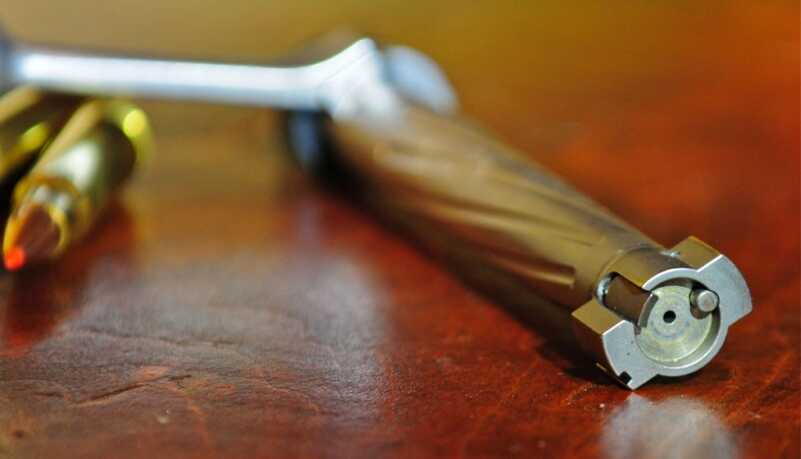
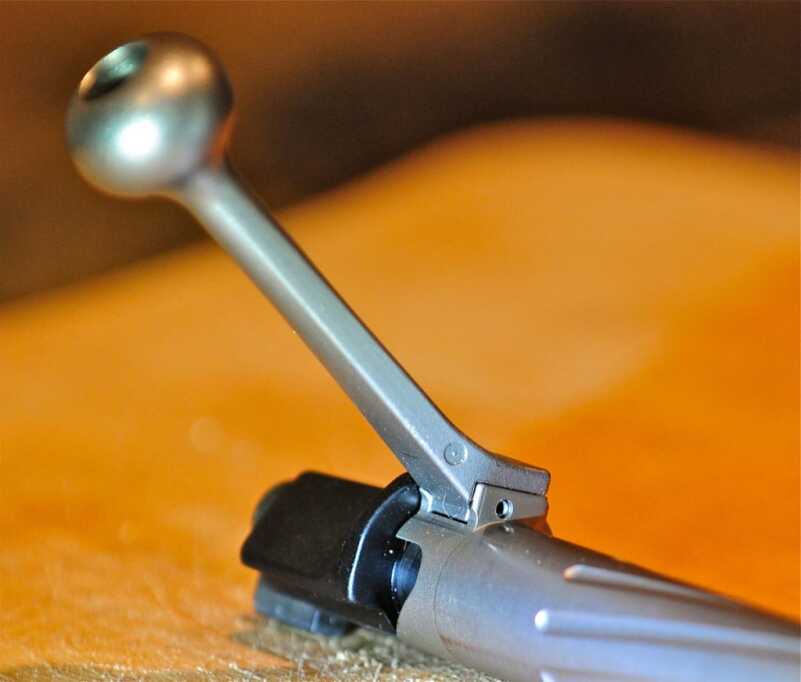
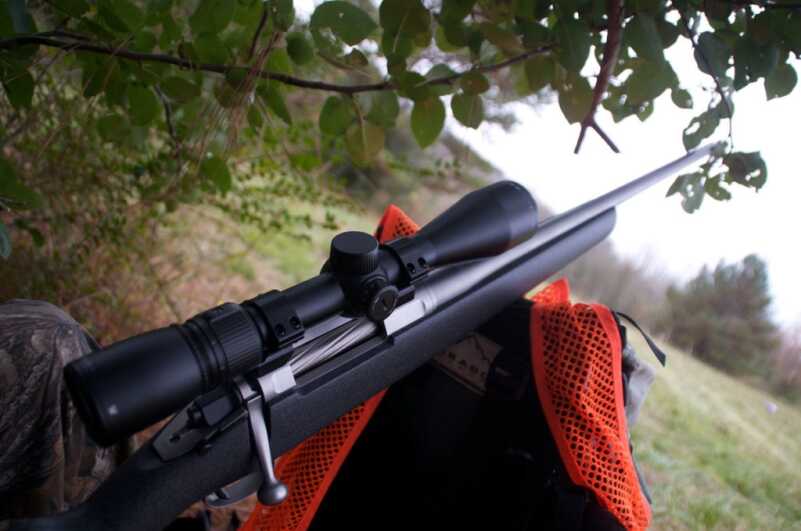
Caliber 308, 41 inch cannon, how many dollars it costs, with telescopic sight and without telescopic sight, for boar hunting.
I want to bring it to Chile
308
The Tikka T3 Superlite runs about $650 and the T3x Superlite runs about $750.
Both weigh less than 6 lbs w/o scope, have stainless actions & (fluted) barrels, holed bolt knobs, and are built by Sako. The Superlites are a Sportsman’s Warehouse exclusive, but you may find them elsewhere.
I own three Kimbers – an Adirondack in 7mm-08, a Mountain Ascent in .300 Win Mag and a Kimber Montana in .300 Win Mag. All shoot sub MOA and are all very light especially the Adirondack. My biggest complaint has been that I really dislike the hollowed out bolt knobs on the Mountain Ascent and Adirondack – They both really bite into the palm of my hand when running the bolt. As a matter of fact I switched out the bolts on .300 Win Mags because I dislike the hollow knob so much. I see that Barrett is essentially copying Kimbers Montana rifle, good for them but the 10th of an ounce saved in weight is really not worth the discomfort I feel when running the bolt – even just a few times. My biggest worry is the pinned bolt on the Barrett and I could see trouble down the road with that design – especially if you are unlucky enough to have a piece of brass that wont easily extract. There have been a few times in my long shooting career where I had to take a rubber mallet to the bolt handle to get it to lift, but those were one piece bolt handles and I was glad that they were!
Wow, the internet sure gives anonymity to those who want to be brutally frank. Not that they are right or wrong just voicing their opinion. I think most Factory rifles are capable of sub 1 inch groups. I’m not even interested if I can’t shoot 5/8 or less and striving for half inch or less. Im a long range varmint hunter. The guy who said he’s gotten halfway decent cars for less money…… well, Everything is relative. A Ferrari will get you from point A to point B also. It depends on how much money you make and what you want. The author is merely reviewing a rifle that is available to people who can afford it and want it. His .7″ group may not be the best the rifle can do. Some people want the Barrett name and under 2k $ gets you that. Barrett is not mass produced in numbers like remington. Qualify and quantify all you want and buy what you want.
I looked at two Kimber hunting rifles yesterday the super lightweight one was $1800.
The Kimber I bought was $800. When I’m done with everything I want to do to it to make it mine, I’ll harvest elk with it.
Looks like retail is closer to $1500, FWIW. Any chance in the future they offer this in 300 Win?
No thanks – I will stick with my Remington 700 SPS Tactical AAC-SD in .308 for $750 +/-
Very impressive rifle, wish I could afford it. I am looking for a good .308, I love the power and the accuracy of the .308, as soon as I can afford it, I will have one.
$1800 bucks – when you can get a Ruger American for under $500. It doesn’t have the prestigious Barrett name, but the 6 – point won’t know if you don’t say anything.
While I respect Barrett, the pinned bolt handle seems like a poor solution.
Not the greatest accuracy shown with factory hunting ammo?
The price and specifications are reasonable.
Very cool rifle but very close to $2k, yeah, NO thanks on that one. God, I have purchased 1/2 way decent used cars for less 🙂 Too bad it is so expensive, guess I will have to stick with my Mossberg and my DPMS…both of them together cost well less than $1800